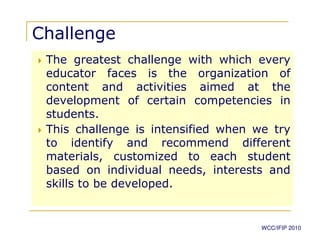Recommendation of Learning Objects Applying Collaborative Filtering and Competencies
- 1. Recommendation of Learning Objects Applying Collaborative Filtering and Competencies Authors: Sílvio César Cazella (UFCSPA,UNISINOS) Eliseo Berni Reategui (UFRGS) Patricia Alejandra Behar (UFRGS) WCC/IFIP 2010
- 2. Sumary Challenge Goals and contribuition Competencies Recommender System Collaborative Filtering Model Prototype and experiments Results Conclusion Future Work WCC/IFIP 2010
- 3. Challenge The greatest challenge with which every educator faces is the organization of content and activities aimed at the development of certain competencies in students. This challenge is intensified when we try to identify and recommend different materials, customized to each student based on individual needs, interests and skills to be developed. WCC/IFIP 2010
- 4. Goal and Contribuition This paper describes a model for recommender systems that is able to suggest learning objects relevant to undergraduate students, focusing on competencies to be developed in the disciplines. The main contribution of this paper is to present this model and its implementation and evaluation with a group of students. WCC/IFIP 2010
- 5. Competencies WCC/IFIP 2010
- 6. Competencies In all definitions, we can easily see the relationship between the concept of competence and skills (know hw), knowledge and attitudes. - o Within this research, therefore, the question arises as to how, when and how we can make a recommendation of learning objects that enable students to: build knowledge related to specific issues, develop particular skills related to given contents, develop in students a critical awareness about the importance of competence to understand how and when to use it. WCC/IFIP 2010
- 7. Is Recommender System a possibility to be used in this context? YES... WCC/IFIP 2010
- 8. Recommender Systems Recommender systems have emerged, focusing on the search for relevant information in accordance with User's own characteristics. Different techniques are applied in recommender systems to find the most appropriate content for users. In this research we applied Collaborative Filtering (CF). Bob WCC/IFIP 2010
- 9. Proposed Model WCC/IFIP 2010
- 10. Prototype and experiments A prototype of the model was developed in order to evaluate its efficiency in making appropriate predictions. Initially, some students were invited to participate in a few experiments for the evaluation of learning objects (in this case scientific papers) that were recommended by the system. WCC/IFIP 2010
- 11. Research Method The evaluation of the prototype was made through two experiments with a sample by convenience (not probabilistic) of 10 students at the end of the undergraduate course of Computer Engineering. Learning objects used to recommend papers were selected by a specialist teacher in the area, and were directly related to the competencies to be developed in the discipline of database. WCC/IFIP 2010
- 12. Experiments and results The experiments had the following objectives: To evaluate whether the prediction rate calculated by the prototype was able to match or approximate to real students’ rates, using the evaluation metric MAE (Mean Absolute Error); To evaluate the accuracy of the recommendations made by the system through the metrics Recall (coverage) and Precision (precision). WCC/IFIP 2010
- 13. 1º Experiment Goal: Evaluation of Pre-Selected Items Description: Students were then requested to evaluate papers that had been allocated randomly; Use the tool prototype; Calculation of Pearson's coefficient. WCC/IFIP 2010
- 14. 1º Experiment: Results 27.59% of the computed correlations between the students using Pearson's coefficient were considered strong (these students had "tastes" that were similar to the objects evaluated); 20.69% were considered weak (these students had " tastes "different from the objects evaluated); 51.72% of the correlations computed, nothing could be said. WCC/IFIP 2010
- 15. 2º Experiment Goal: Generating Predictions; Description: Performing the computation of the correlation values and prediction of similarity; The rules of competencies; Recommendations to users; Evaluation Metrics. Sample 10 students Likert scale of 5 points WCC/IFIP 2010
- 16. Results of the experiment concerning Precision 16 WCC/IFIP 2010
- 17. Results of the 2º Experiment WCC/IFIP 2010
- 18. Conclusion Through experiments with a group of undergraduate students in Computer Engineering, it was found that the degree of precision achieved by the recommendations generated by the prototype was satisfactory. The accuracy of 76% showed that the system was able to recommend learning objects that satisfied the students for their studies, without neglecting the competencies required in the summary of the course during the semester. WCC/IFIP 2010
- 19. Conclusion As for the evaluation metrics Precision and Recall, it can be said that: the prototype succeeded to get the students to have access to those materials that were relevant to the competencies to be developed in that moment, within the set of learning resources available. WCC/IFIP 2010
- 20. Future work we intend to test the system with other types of learning objects to verify if its performance remains satisfactory, using information from the metadata of learning objects to select them according to specific requirements also related to competencies development (e.g. level of difficulty, level of interaction, etc.); include the relevance of the opinion of a User to complement the process of recommendation; we are also working on the formation of virtual communities that have a similarity coefficient within an acceptable range. WCC/IFIP 2010
- 21. That is all folks! Questions? Thanks!!! Contact: Silvio Cesar Cazella cazella@unisinos.br silvioc@ufcspa.edu.br WCC/IFIP 2010




















